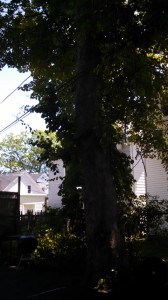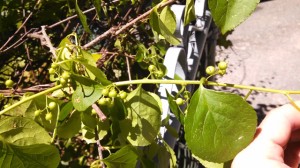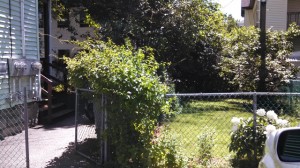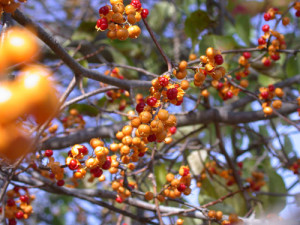Invasive Vine “Oriental Bittersweet” Leads to Overgrown Property
| . Posted in advice - 0 Comments
Landlords sometimes get beaten up behind their back for letting their properties get overgrown. Well, they could be excused for not defending against the "oriental bittersweet," an extremely invasive vine that can quickly lead to an overgrown property.
What defines an Overgrown Property?
There's no hard and fast rule, but here's a quote from a city full of trees:
Worcester: All property shall be kept free of overgrown, decayed, dead,
or hazardous trees, shrubs, or any other vegetation that poses a hazard to the
health and safety of any person in the vicinity of the property, including any
persons traveling on any portion of any public way, or any surrounding
property.
(Oddly, although Boston and Cambridge issue fines for overgrown properties, a search of their ordinances turns up nothing with the phrase "overgrown" or related terms.)
Suffice it to say, the vines on the fence below are a head-height hazard, and impede the functioning of the fence.
Why is "Oriental Bittersweet" an Invasive Vine?
It's invasive because it's out-competing the native New England vine that normally occupies this niche, and it's spreading itself all over road sides, fences, hedges, buildings, and telephone poles. Oriental bittersweet is better at dealing with low-light conditions, makes better use of sunlight, grows faster into the sunlight (sometimes up to 12 feet in a year!), and is spread more easily by birds.
The vine is so effective at smothering its support that it even threatens to kill trees.

Oriental bittersweet has climbed up onto this tree, and can be seen reaching for the telephone wire.
It kills trees by either blotting out the sun or cutting off water circulation (strangulation).
The problem, at least as far as landlords are concerned, is that it's easily mistaken for a welcome touch of beauty. It's solidly green in summer, brilliant yellow in fall, and warm with red berries and orange flare through the cold winter. Beautiful! Until it smothers your tenants.
What Do you Do with Oriental Bittersweet?
First, be sure that you have the invasive variety and not the native New England variety. The native variety grows flowers and berries only at the tip of each vine, but the invasive version has flowers and/or berries at the base of the leaves.

Oriental bittersweet out-competes the native variety by being prolific with flowers and berries at the base of each leaf.
The one thing you can do today to get rid of it is cut it all up and throw it away. It will be extremely difficult to pull it up by the roots if it's as big as the vines in these photos, and you're going to have to monitor it for another year to pull up additional shoots that try to revive what you destroyed. But at least that way, you don't chemically harm other plants growing in your yard.
You can also buy chemicals to kill the vine, but then you're still left with its dead wood all over the fence, and if you don't apply the chemicals in late fall, you're likely to take out your landscaping, as well. The National Resources Conservation Services advises mechanically removing the vine, and then applying an herbicide containing triclopyr or glyphosate to the cut portion. These chemicals usually sell under the dangerous sounding "Weed AND Grass Killer." So careful not to spill it on your lawn.
So now you know! Watch out for baby vines twisting their way up chain link, gutters, posts, and trees. If you have someone to manage your properties, or a landscaper, share this article with them and tell them you don't want this vine on your property. You'll be glad you stopped it early!






